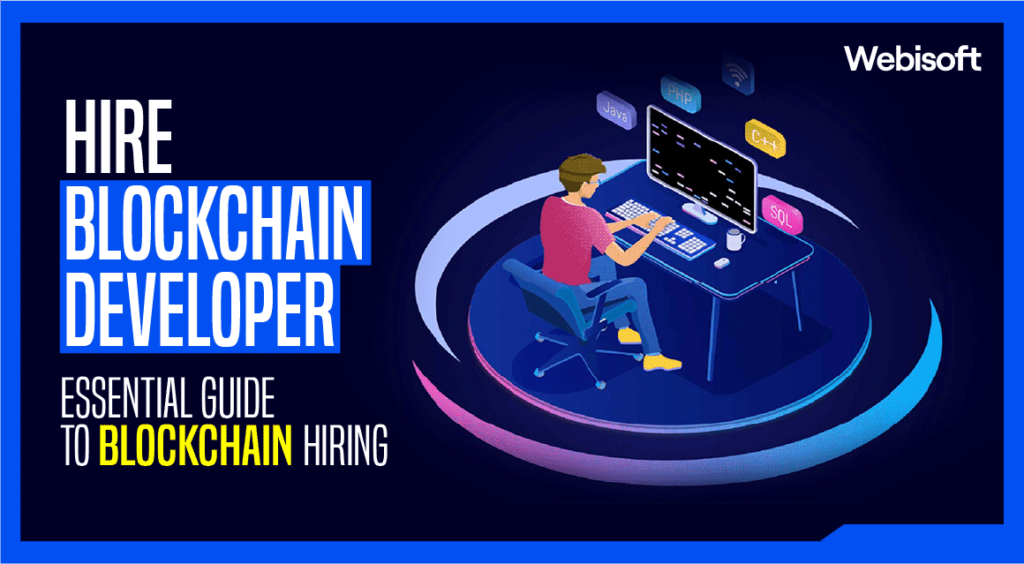Looking to hire blockchain developers? You’re in the right place! In today’s fast-paced digital world, blockchain technology has emerged as a game-changer with the potential to transform industries and revolutionize the way we do business.
Whether you’re a startup with a groundbreaking idea or an established enterprise seeking to incorporate blockchain into your operations, finding a skilled blockchain developer is key to turning your vision into reality.
When it comes to hiring a blockchain developer, it’s important to find someone with the right expertise and experience. They should be proficient in programming languages such as Solidity, JavaScript, or Python, and have a strong grasp of blockchain platforms like Ethereum, Hyperledger, or Polkadot.
Beyond technical skills, a great blockchain developer should also be a good communicator and collaborator. They should understand your business objectives and be able to translate them into practical solutions. This collaborative approach ensures that the end product aligns with your vision and meets your requirements.
So, if you’re ready to embrace the potential of blockchain and take your business to new heights, it’s time to hire a blockchain developer who can bring your ideas to life and unlock the endless possibilities of this transformative technology.
Contents
- 1 What is the Role of Blockchain Developers?
- 2 Hire Blockchain Developer: The Top 5 Factors to Consider
- 3 How to Assess the Proficiency of Top Blockchain Developers: The Essence of Blockchain Hiring
- 4 Where to Find and Hire Blockchain Developers: The True Job Boards
- 5 Tips for Evaluating Blockchain Developers’ Skills
- 6 Top Countries for Hiring Blockchain Developers
- 7 How Much Does It Cost to Hire a Blockchain Developer?
- 8 Final Words
- 9 Frequently Asked Questions
- 9.1 How do blockchain developers ensure the security of smart contracts?
- 9.2 Are there any industry-specific considerations when hiring blockchain developers?
- 9.3 Can blockchain developers assist in conducting blockchain audits for existing systems?
- 9.4 What are the challenges in hiring blockchain developers?
- 9.5 Can blockchain developers assist in integrating blockchain with legacy systems?
What is the Role of Blockchain Developers?
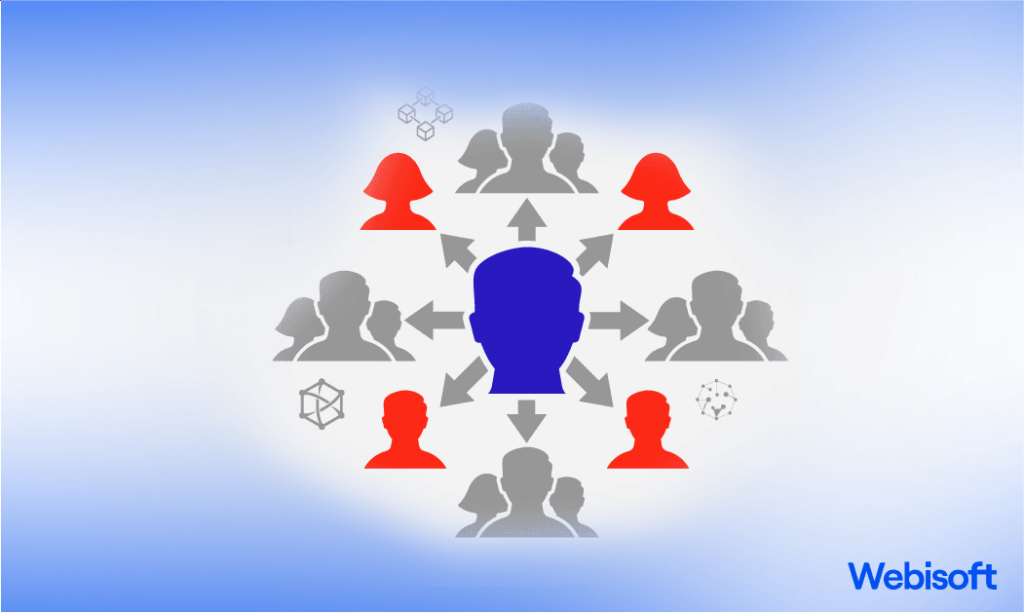
In order to set up and maintain blockchain-based systems, finding the top blockchain developers is essential. In the context of the roles of blockchain developers, their duties go beyond those of conventional software development, necessitating particular knowledge and abilities.
This aligns with the blockchain framework, which governs the development and management of blockchain systems.
Responsibilities
- Designing and developing blockchain architectures and solutions.
- Collaborating with stakeholders to identify and define requirements for blockchain projects.
- Implementing and integrating blockchain protocols and platforms.
- Writing smart contracts and deploying them on blockchain networks.
- Ensuring the security and integrity of blockchain systems.
- Conducting regular audits and debugging to identify and fix issues.
- Optimizing blockchain performance and scalability.
Skills
- Proficiency in programming languages like Solidity, JavaScript, or Go.
- Familiarity with blockchain frameworks such as Ethereum, Hyperledger, or EOS.
- Knowledge of cryptographic principles and protocols used in blockchain technology.
- Understanding of decentralized applications (DApps) and their development.
- Experience with smart contract development and deployment.
- Strong problem-solving and analytical skills.
- Attention to detail and thoroughness in testing and debugging.
- Familiarity with secure coding practices and blockchain security mechanisms.
Hire Blockchain Developer: The Top 5 Factors to Consider
To select the best candidate for your project, you need to examine a number of important considerations while hiring a blockchain engineer.
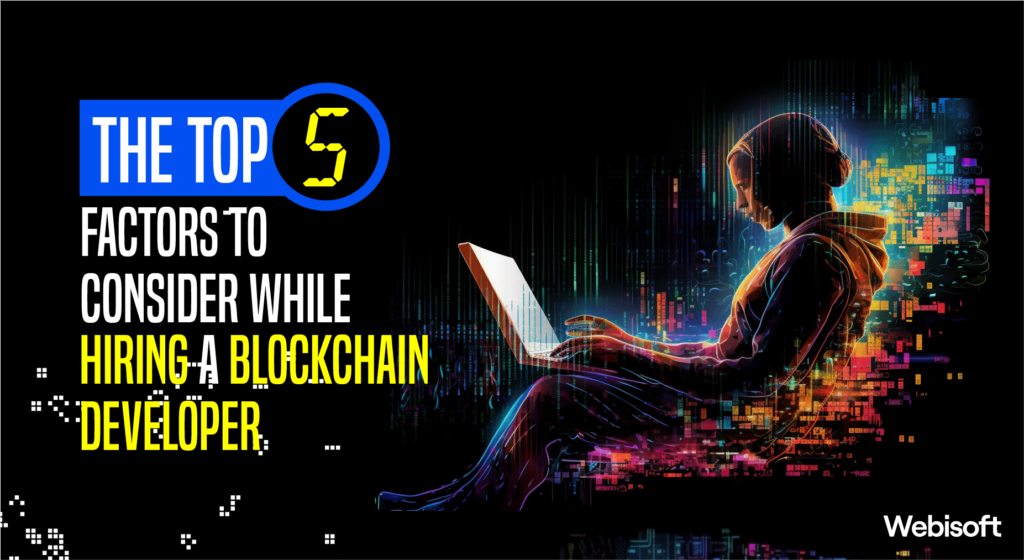
Here are five important things to think about:
1. Experience
Look for a blockchain developer with relevant industry experience. Consider their track record in developing blockchain applications and the number of completed projects. Prior experience demonstrates their ability to navigate the complexities of blockchain technology and deliver successful results.
2. Technical Skills
Assess the candidate’s technical skills, including proficiency in programming languages such as Solidity, JavaScript, or Go. Familiarity with blockchain frameworks like Ethereum, Hyperledger, or EOS is also crucial.
A developer with a strong technical foundation will be better equipped to handle the challenges of blockchain development.
3. Educational Background
While formal education is not always a determining factor, it can provide a solid foundation in computer science or related fields. Look for candidates with relevant degrees or certifications in blockchain technology or related disciplines.
Such educational backgrounds indicate a commitment to learning and staying updated on the latest industry trends.
4. Problem-Solving Abilities
Blockchain development often involves solving complex problems. Assess the candidate’s problem-solving skills through technical interviews or coding assessments. Look for their ability to think critically, analyze situations, and devise innovative solutions.

A developer with strong problem-solving abilities can overcome challenges and deliver efficient blockchain solutions.
5. Teamwork and Adaptability
Collaboration is essential in blockchain projects. Evaluate the candidate’s ability to work in a team environment, communicate effectively, and collaborate with stakeholders. Blockchain technology is constantly evolving, so adaptability is crucial.
Look for candidates who demonstrate a willingness to learn, embrace change, and adapt to new developments in the blockchain space.
How to Assess the Proficiency of Top Blockchain Developers: The Essence of Blockchain Hiring
When hiring a blockchain developer, evaluating their understanding of fundamental programming concepts, encryption and security, data structures, blockchain principles, and relevant development tools is crucial.
Here are key points to consider when assessing a developer’s proficiency in these areas:
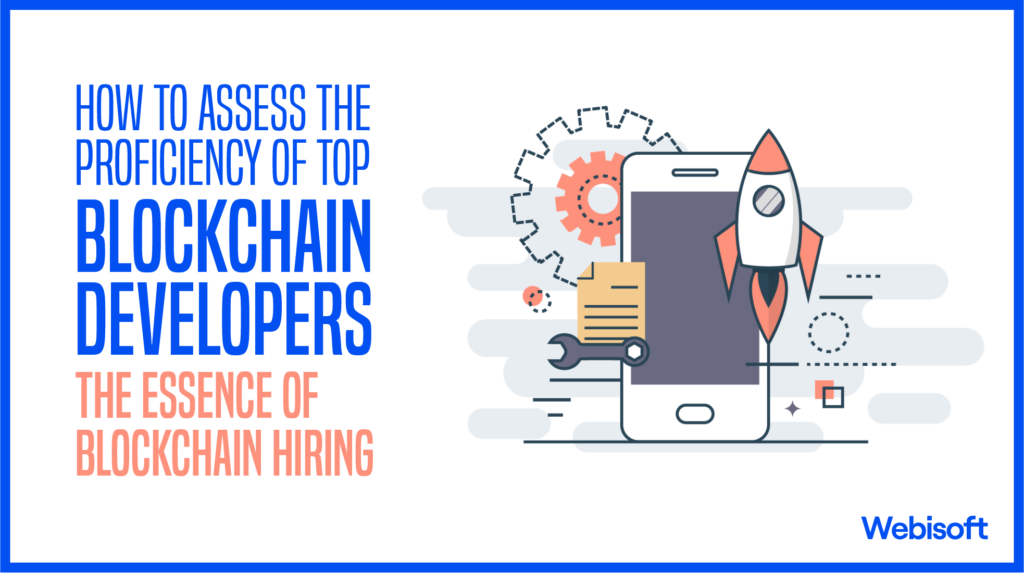
Basic Programming Concepts
It is essential to verify that a blockchain developer has a solid grasp of various programming languages and fundamental concepts when considering them for hire. Let’s find out more!
Programming Languages
A talented blockchain developer should be familiar with the programming languages such as C, C++, Python, JavaScript, Node.js, Solidity, Java, and Go. This is because they are commonly used in blockchain development.
Understanding these languages allows developers to work with different blockchain platforms and implement various functionalities.
Object-Oriented Programming Structure (OOPS)
OOPS is a programming paradigm centered around the concept of objects. It organizes code into classes, which group related objects together.
This approach allows for efficient code modification without affecting other objects in the program. It is widely used in blockchain development to create modular and scalable code.
Syntax
Syntax refers to the rules and structure of programming languages. A blockchain developer should understand the basic syntax for programming languages such as loops, while loops, conditional statements, logical operators, arithmetic operators, and relational operators.
Understanding syntax enables developers to write clean and error-free code.
Multi-Threading
Multi-Threading is the ability of a CPU to execute multiple threads or processes simultaneously. In blockchain development, multi-threading is important for achieving parallelism and improving performance.
A developer with knowledge of multi-threading can design and implement efficient and concurrent blockchain applications.
Socket Programming
Socket Programming is a method for establishing communication between two nodes on a network. It allows clients and servers to exchange data and interact with each other.
Understanding socket programming is crucial for blockchain developers as it enables them to build decentralized applications (DApps) that can communicate with the blockchain network.
Encryption and Security
It is a must to verify that a blockchain developer has a strong grasp of encryption concepts, as blockchain data transfer security heavily depends on robust encryption standards. We are going to elaborate on this!
Secure Hashing Algorithm (SHA)
SHA, or Secure Hashing Algorithm, is a set of algorithms designed to address cybersecurity challenges and maintain data security. It applies a hash function to transform data using techniques like modular additions, compression functions, and bitwise operations.
SHA includes versions like SHA-0, SHA-1 (with 16-bit hashing), and SHA-2 (with 512-bit and 256-bit technologies). These iterations of SHA are crucial for upholding data integrity and security in blockchain and other cryptographic systems.
Encryption and Decryption
Encryption involves using cryptographic techniques to convert plain text into unreadable ciphertext, while decryption reverses this process to transform the ciphertext back into plain text.
In the context of blockchain, encryption plays a vital role in safeguarding sensitive data and ensuring confidentiality during data transmission.
It provides an essential layer of security to protect the integrity and privacy of information within the blockchain network.
Private Key and Public Key
Public and private key pairs are cryptographic keys used for encryption and decryption. The public key, available to everyone, encrypts data, while the private key, kept confidential, decrypts the data.
These mathematically related keys ensure secure communication. Data encrypted with a public key can only be decrypted with the corresponding private key, and vice versa.
Data Structures
Whether you’re looking to hire a blockchain developer or a full-stack developer, understanding data structures is essential as it forms the core of software development.
Here’s a more detailed analysis of the key data structures that a blockchain developer should be familiar with:
Linked List
A linked list is a linear data structure where elements are linked together using pointers.
Each element, called a node, holds data and a reference to the next node. Linked lists are dynamic and excel at inserting and deleting elements, but sequential access can be slower than arrays.
Hash Table
A hash table is a data structure that maps keys to their corresponding values, functioning as an associative array. It leverages a hash function to calculate an index in an array of slots, enabling efficient retrieval of values based on their keys.
In the blockchain, hash tables are frequently employed for the optimized storage and retrieval of key-value pairs, facilitating tasks like organizing transactions based on transaction IDs.
Acyclic Graph
An acyclic graph is a graph structure without loops or cycles. It is a bipartite graph and represents a path without repeated vertices, except for the starting and ending points.
Acyclic graphs are essential in blockchain for tasks like illustrating transaction dependencies or organizing the block structure of the blockchain.
Blockchain Concepts
When considering hiring blockchain developers, it is essential that they possess a strong grasp of fundamental blockchain concepts. Let’s check out these concepts.
Distributed Ledger Technology (DLT)
DLT, or Distributed Ledger Technology, allows for the decentralized sharing, synchronization, and replication of digital data across multiple nodes rather than relying on a single central location. It is crucial for developers to comprehend the functioning of DLT and its application in various types of blockchains.
Understanding DLT enables developers to design and implement secure and efficient blockchain systems.
Immutability
Immutability refers to the property of data in a blockchain that once it is written, cannot be changed. This ensures the integrity and reliability of information stored in the blockchain.
Consensus
Consensus is the decision-making process in a blockchain network, where all participants agree on the validity of new blocks or changes. Consensus mechanisms ensure the trustworthiness and agreement among network participants.
Crypto Tokens
Crypto tokens are digital assets that represent various utilities or assets on a blockchain. They can be traded and have different use cases, such as cryptocurrencies, loyalty points, or asset ownership.
Smart Contracts
Smart contracts are self-executing contracts with predefined rules encoded in them. They automate and enforce the terms of agreements, eliminating the need for intermediaries and ensuring transparent and secure transactions.
DApps
DApps, or decentralized applications, run on a peer-to-peer network instead of relying on a single central authority. They leverage blockchain technology to provide transparency, security, and user control.
Sharding
Sharding is a technique used to improve the scalability and efficiency of blockchains. It involves splitting the data into smaller parts (shards) and distributing them across multiple nodes, reducing the burden on individual nodes.
Public Blockchain
Public blockchains allow anyone to join, participate, and contribute to the network. They are typically open and transparent, providing accessibility to all participants.
Permissioned Blockchain
Permissioned blockchains restrict access and participation to authorized entities or participants. They provide privacy, control, and governance within a blockchain network.
Development Tools
A blockchain developer should possess a basic understanding of various development tools that are commonly used in blockchain development. These tools include:
Composer
Composer is an open-source tool that enables developers to build blockchain applications. It provides a set of development frameworks, APIs, and utilities to simplify the process of creating and deploying blockchain networks and smart contracts.
Explorer
Explorer is a tool used to develop user-friendly web applications for interacting with blockchain networks. It allows users to explore and visualize blockchain data in a user-friendly manner, making it easier to understand and analyze the information.
Remix
Remix is an open-source tool that allows developers to write Solidity smart contracts directly from the browser. It provides an integrated development environment (IDE) with features like code editing, debugging, and deployment capabilities.
Metamask
Metamask is a popular browser extension wallet that enables users to manage and transfer cryptocurrencies from one wallet address to another. It acts as a bridge between the web browser and blockchain networks, allowing seamless interaction with decentralized applications (DApps).
Etherscan
Etherscan is a blockchain explorer tool specifically designed for the Ethereum network. It allows users to explore and analyze smart contracts, transactions, and blocks on the Ethereum blockchain. It provides transparency and visibility into the Ethereum ecosystem.
Mist
Mist is a desktop application that serves as an interface for interacting with the Ethereum blockchain. It acts as a wallet and provides a user-friendly environment for managing Ethereum accounts and executing transactions.
Caliper
Caliper is a performance measurement framework specifically designed for blockchain implementations. It allows developers to benchmark and analyze the performance of a particular blockchain network, providing insights into its efficiency and scalability.
Bitcoin BlockExplorer
Bitcoin BlockExplorer is a tool that provides detailed information about Bitcoin addresses, transactions, and blocks. It allows users to explore the Bitcoin blockchain and track the flow of transactions.
Where to Find and Hire Blockchain Developers: The True Job Boards
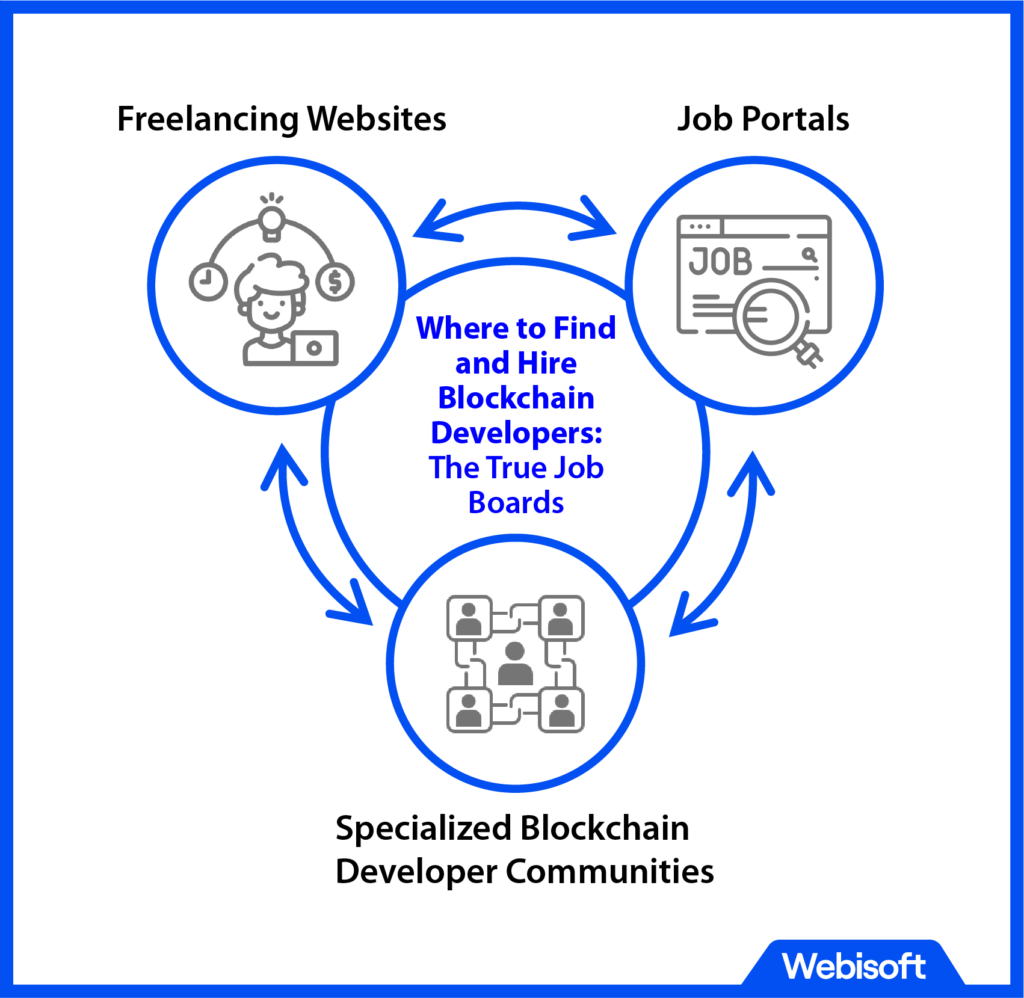
Many platforms and resources are available to you while looking for skilled blockchain engineers, and they can assist you in connecting with capable applicants. Here are some options to think about:
1. Freelancing Websites
Access to a sizable pool of independent blockchain coders is provided via websites like Upwork, Freelancer, and Toptal. Flexibility, cost-effectiveness, and the capacity for on-demand hiring are positives.
However, judging the caliber and dependability of freelancers requires careful consideration of their résumés, portfolios, jobs, and client reviews.
2. Job Portals
Job postings for blockchain developers can be made on websites like Glassdoor, Indeed, and LinkedIn. These websites draw a wide variety of professions and offer in-depth candidate profiles.
However, the lengthy hiring procedure might be challenging to find top personnel. Though it sounds lengthy for a top personnel, if you are hiring full time, make sure to check out the years of experience, availability full-time, and their level of efficiency.
3. Specialized Blockchain Developer Communities
Blockchain engineers can promote their work in active forums and repositories on websites like GitHub, Stack Overflow, and Bitcointalk.
By participating in these forums, you can identify enthusiastic developers about blockchain and learn about their experience. However, finding and contacting potential individuals might take more work.
Tips for Evaluating Blockchain Developers’ Skills
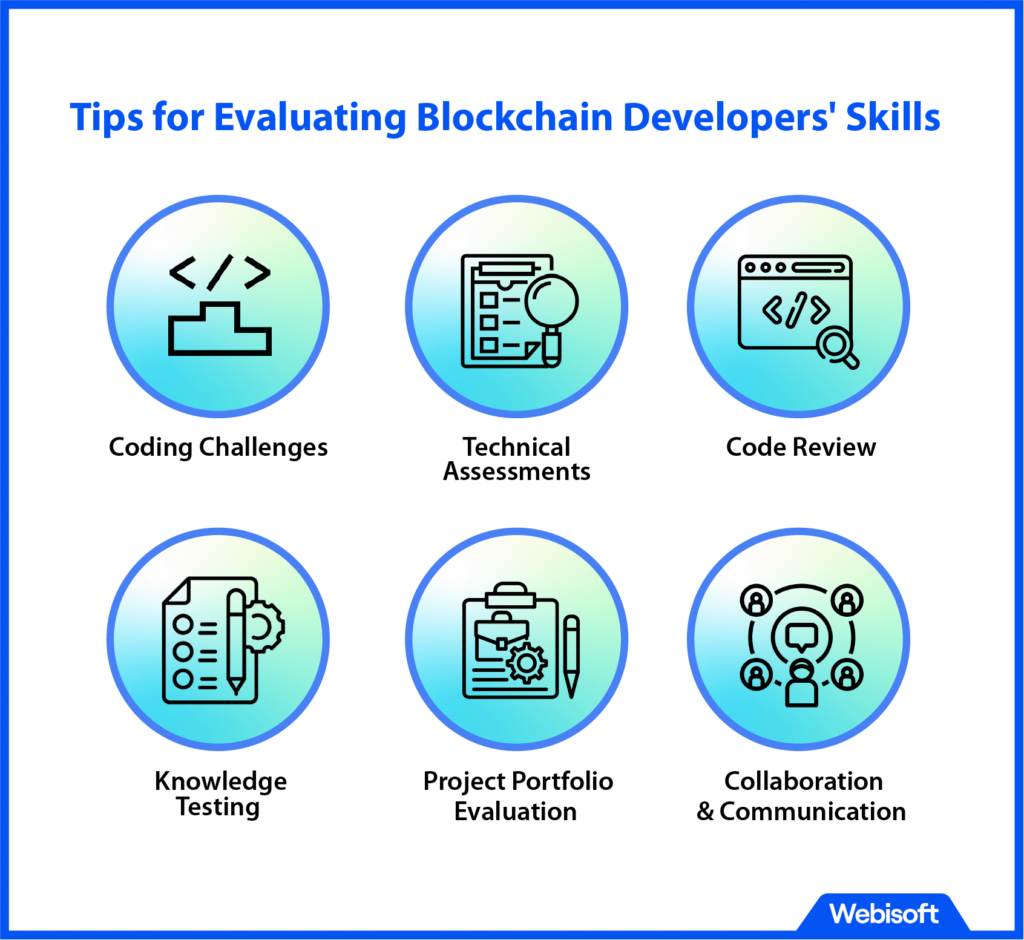
It’s crucial to use practical methods that effectively assess blockchain technology expertise when assessing the abilities of blockchain engineers. Here are some ideas to think about:
1. Coding Challenges
Assign coding challenges specific to blockchain development to assess a developer’s problem-solving abilities, familiarity with smart contracts, and understanding of blockchain protocols.
2. Technical Assessments
Conduct technical assessments that focus on relevant programming languages (e.g., Solidity), blockchain frameworks (e.g., Ethereum), and development tools (e.g., Truffle, Remix).
These assessments can include tasks like writing and deploying smart contracts or developing decentralized applications (DApps).
3. Code Review
Request candidates to share their previous blockchain-related projects or code samples. Conduct a thorough code review to assess their code quality, adherence to best practices, efficiency, and security considerations.
4. Knowledge Testing
Pose technical questions during interviews to evaluate a developer’s understanding of blockchain fundamentals, consensus mechanisms, security measures, and decentralized concepts. This can help determine their depth of knowledge and ability to apply it practically.
5. Project Portfolio Evaluation
Examine a candidate’s project portfolio to assess their experience with different blockchain platforms, industry domains, and project complexities. Look for projects that align with your specific requirements and evaluate their past work’s quality, innovation, and scalability.
6. Collaboration and Communication
Assess a developer’s ability to work in a team and effectively communicate their ideas and solutions. This is particularly important in blockchain development, as collaboration and coordination are crucial in decentralized environments.
Top Countries for Hiring Blockchain Developers
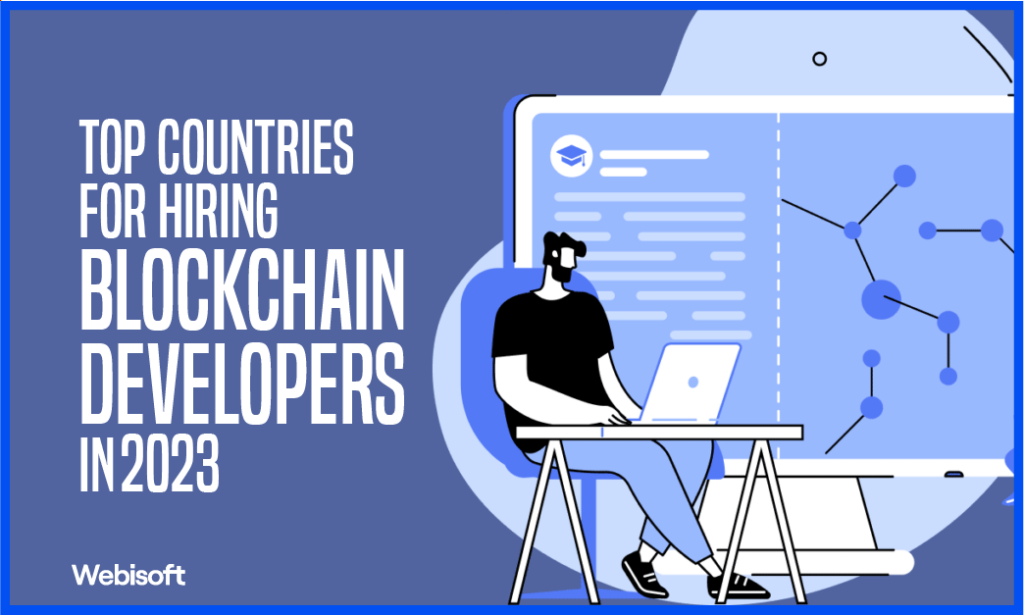
The top countries for hiring blockchain developers are:
1. United States
When it comes to the number of blockchain developers, the United States takes the lead. With a thriving tech industry and a strong focus on blockchain technology, there is a vast pool of talent available.
However, it’s important to note that hiring developers in the U.S. can be costly due to higher living standards and salaries.
2. India
India is another popular destination for hiring blockchain developers. The country offers cost-effective solutions, making it an attractive option for companies seeking affordable blockchain development services.
However, there may be concerns about the quality of work, so thorough evaluation is recommended when considering Indian developers.
3. United Kingdom
In the United Kingdom, you can find a significant number of skilled blockchain developers. The country’s advanced tech ecosystem and strong emphasis on innovation make it an ideal location for hiring blockchain talent.
However, similar to the U.S., the cost of hiring developers in the UK tends to be higher.
4. Canada
Canada is known for its highly skilled workforce, and the blockchain sector is no exception. The country has a growing community of blockchain developers, making it a promising choice for companies in need of such expertise.
While the salaries may be lower compared to the U.S. and UK, they can still be relatively high.
5. France
France is also making its mark in the blockchain industry, with a considerable number of developers specializing in this field. The country’s tech scene is thriving, and its proximity to other European countries adds to its appeal as a hiring destination for blockchain talent. However, it’s worth noting that costs may be higher due to the standard of living.
6. Eastern Europe: Ukraine, Poland, Belarus
For cost-effective yet high-quality blockchain development, Eastern European countries such as Ukraine, Poland, and Belarus are excellent choices.
These countries provide a favorable balance between affordable rates and skilled developers.
Ukraine, in particular, stands out with its well-educated youth, English language proficiency, and a growing expertise in blockchain development.
7. Netherlands and Singapore
The Netherlands and Singapore are both noteworthy options for hiring blockchain developers. These countries have a substantial number of developers, and their proximity to global blockchain players adds to their appeal.
However, it’s important to consider that the living standards in these countries can result in higher development costs compared to Eastern European countries or India.
In summary, the top five countries to hire blockchain developers include the United States, India, the United Kingdom, Canada, and France.
However, companies often seek cost-effective solutions by turning to Eastern European countries, such as Ukraine, Poland, and Belarus, or considering adjacent countries like the Netherlands and Singapore, which have a strong presence of blockchain developers but higher costs of living.
How Much Does It Cost to Hire a Blockchain Developer?

When it comes cost, the blockchain developer salary can vary depending on various factors. To give you an idea of the average salaries and rates for blockchain developers, we’ve gathered information from different hiring platforms.
Let’s start with the annual salaries for blockchain developers in different countries:
- In the United States, the average annual salary for a blockchain developer is around $153,000.
- In Canada, you can expect to pay an average of $90,000 per year for a blockchain developer.
- In the United Kingdom, the average annual salary for a blockchain developer is approximately $81,000.
- In Germany, the average annual salary is about $99,000 for a blockchain developer.
- In Brazil, you can hire a blockchain developer for an average annual salary of $80,000.
- In India, the average annual salary for a blockchain developer is much lower at around $14,000.
Now, let’s talk about the hourly rates you can expect to pay for blockchain developers on Upwork:
On Upwork, the rates can vary depending on the experience and skills of the developers. Here are the general ranges for blockchain developer hourly rates:
- The minimum hourly rate you might find on Upwork is around $25.
- The average hourly rate for blockchain developers on the platform is approximately $67.
- If you’re looking for top-rated talent with extensive experience, the maximum hourly rate can go up to $230.
Please note that the figures provided are based on data from the mentioned platforms and should be used as a reference. The actual rates you encounter may vary depending on the specific requirements of your project and the expertise of the developer you choose to hire.
Final Words
In conclusion, the importance of hiring a blockchain developer or partnering with a dedicated blockchain development team cannot be overstated. They possess the knowledge and expertise required to navigate the intricacies of blockchain technology and bring your projects to life.
Collaborating with a team of blockchain experts offers additional advantages. Teamwork allows for diverse perspectives and collective problem-solving, ensuring that your projects benefit from a range of skills and experiences.
Effective project management ensures that timelines are met, resources are optimized, and deliverables are of the highest quality. Seamless communication with your chosen development team guarantees that your vision is understood and translated into tangible solutions.
If you’re ready to embark on your blockchain journey and need assistance from a trusted partner, consider reaching out to Webisoft. With our expertise in blockchain development, we can provide comprehensive services to help you leverage the power of this transformative technology.
Frequently Asked Questions
How do blockchain developers ensure the security of smart contracts?
Blockchain developers ensure the security of smart contracts by conducting thorough code reviews, following best practices, implementing secure coding techniques, and performing extensive testing and auditing procedures.
Are there any industry-specific considerations when hiring blockchain developers?
Yes, when hiring blockchain developers, it is important to consider industry-specific knowledge and experience, as different sectors may have unique requirements and use cases for blockchain technology.
Can blockchain developers assist in conducting blockchain audits for existing systems?
Yes, blockchain developers can assist in conducting blockchain audits for existing systems by evaluating the integrity, security, and performance of the blockchain infrastructure and identifying any potential vulnerabilities or areas for improvement.
What are the challenges in hiring blockchain developers?
Challenges in hiring blockchain developers include high demand, a limited talent pool, and evolving technology. Mitigation strategies involve expanding recruitment channels, offering competitive compensation, providing training opportunities, and fostering a positive work environment to attract and retain top blockchain talent.
Can blockchain developers assist in integrating blockchain with legacy systems?
Yes, blockchain developers can assist in integrating blockchain with legacy systems by leveraging interoperability solutions, developing APIs or middleware layers, and ensuring seamless data flow between the blockchain and existing systems.
